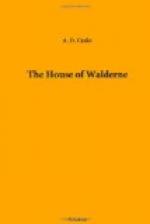“Are not those the towers?” said the young squire, pointing to some extinguisher-like turrets which just then came in sight.
“Verily they be, and if we make haste we may reach them by noontide.”
But between them and the object of their journey lay a deep fosse or moat, and the rusty drawbridge was suspended by its chains to the walls of the towers.
“Blow thine horn, Almeric.”
It was long blown in vain, but at length an old man in squalid attire, with long dishevelled gray locks and matted beard, appeared at the window of the watch tower above.
“Whom seek ye here, in the haunted Castle of Fievrault?”
“The sword of its last lord, that I may bear it to the Holy Land in his name, and lay it on the Holy Sepulchre of our Lord.”
“Thou art the man the fates foretell. Lo, I will let down the bridge, and thou mayst enter.”
“What a squalid old man! Can he be the sole inhabitant?” said Almeric in a whisper.
The rusty machinery creaked, the bridge sank into its appointed place, and at the same moment the portcullis was heard to wind up with a grating sound. The little troop entered the courtyard through the gateway in the tower.
A ruined castle! the dismantled towers rose around them with the great hall, the windows broken, the casement shattered. Ivy grew around the fragments, and embracing them, veiled their squalidness with its green robe, making that picturesque which anon was hideous. But company gives confidence, and our little troop rode, laughing and talking, into the haunted Castle of Fievrault.
“I have no food,” said the old man.
“We need none; we have brought both meat and wine. Wilt thou share it? Thou look’st as if a good meal might do thee good.”
“I have eaten my frugal meal already, and desire none of your cates and dainties. Lo, I am ready to conduct you to the hall where hangs the sword of the man whom thy father slew one Friday long ago, and it will be well for thee but to tarry while thou takest it and then depart.”
“We will eat our nuncheon, with your leave, in the castle hall.”
“I cannot say you nay.”
He took them to the half-dismantled dining hall, where hung the portraits of the old lords of Fievrault rudely limned, and conspicuous amongst them those of the founder of the house, and his loathly lady; the painter had not flattered them.
There hung several swords, rusty with age and disuse, two-handed weapons which it required a giant strength to wield; huge battle-axes, maces, clubs tipped with iron spikes, ancient suits of armour, rusty and unsightly, as old clothing of that sort is apt to become after the lapse of years. There was no vacant hook now, for at the end of the row hung the sword of the ill-fated Sieur de Fievrault, the last of his grim race.
The Englishmen gazed upon the portraits, which they regarded with insular irreverence (what were French knights and dames to them?), then without awe spread the contents of their wallets on the board, and feasted in serenity and ease.




